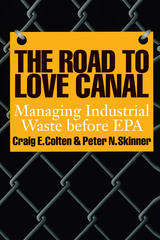
Love Canal. We hear these words and quickly recoil, remembering a community poisoned by toxic waste. Twenty years after the incident, Allan Mazur reexamines the circumstances that made this upstate New York neighborhood synonymous with ecological catastrophe and triggered federal "Superfund" legislation to clean up the nation's thousands of hazardous waste sites.
But is there only one true story of Love Canal? Borrowing the multi-viewpoint technique of the classic Japanese film Rashomon, Mazur's book reveals that there are many--often conflicting versions of what occurred at Love Canal. Hooker Chemical Company, which deposited the toxic wastes, explains why it subsequently donated the dump as the site for a new school. Lois Gibbs, whose son attended the school, tells of organizing the community to fight both the chemical threat and the uncaring state bureaucracy. Then there is the story of David Axelrod, New York's embattled commissioner of health, at odds with the homeowners over their assessment of the hazards and the proper extent of the state's response. We also hear from Michael Brown, the young reporter who developed the story in the Niagara Gazette and eventually brought the problem of toxic waste to national attention.
If A Hazardous Inquiry succeeded only in making us understand why one version of the events at Love Canal gained precedence over all others, it would be invaluable to policy makers, journalists, scientists, environmentalists, lawyers, and to citizens caught up in technical controversies that get played out (for better or worse) in the public arena. But the book moves beyond that to evaluate and reconcile the conflicting accounts of Love Canal, giving us a fuller, if more complex, picture than ever before. Through gripping personal tales, A Hazardous Inquiry tells how politics and journalism and epidemiology sometimes mesh, but often clash, when confronting a potential community disaster.


The toxic legacy of Love Canal vividly brought the crisis in industrial waste disposal to public awareness across the United States and led to the passage of the Superfund legislation in 1980. To discover why disasters like Love Canal have occurred and whether they could have been averted with knowledge available to waste managers of the time, this book examines industrial waste disposal before the formation of the Environmental Protection Agency in 1970.
Colten and Skinner build their study around three key questions. First, what was known before 1970 about the hazards of certain industrial wastes and their potential for causing public health problems? Second, what were the technical capabilities for treating or containing wastes during that time? And third, what factors other than technical knowledge guided the actions of waste managers before the enactment of explicit federal laws?
The authors find that significant information about the hazards of industrial wastes existed before 1970. Their explanations of why this knowledge did not prevent the toxic legacy now facing us will be essential reading for environmental historians and lawyers, public health personnel, and concerned citizens.
READERS
Browse our collection.
PUBLISHERS
See BiblioVault's publisher services.
STUDENT SERVICES
Files for college accessibility offices.
UChicago Accessibility Resources
home | accessibility | search | about | contact us
BiblioVault ® 2001 - 2024
The University of Chicago Press









